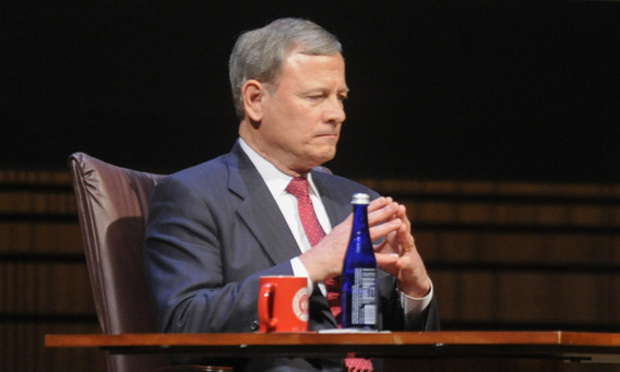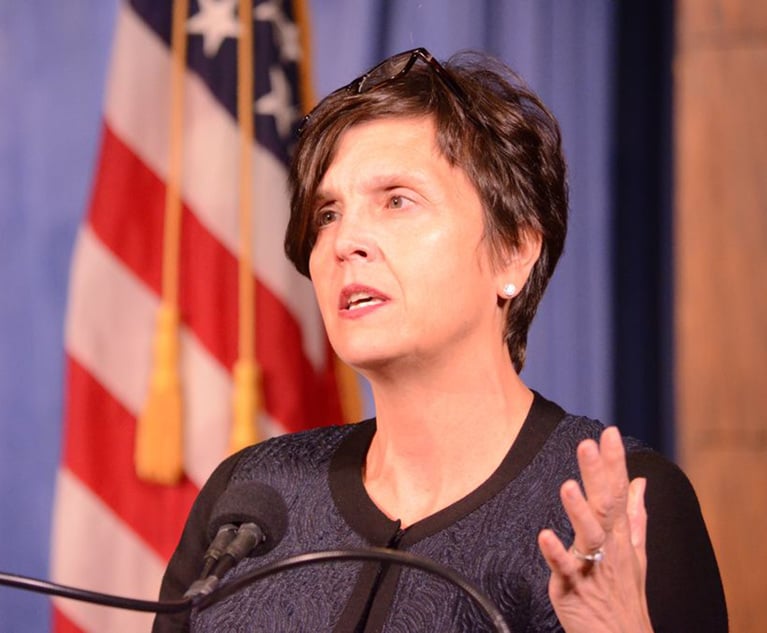Chief Justice Roberts: Judges Are a Check Against 'False Information'
"The public's need to understand our government, and the protections it provides, is ever more vital," Chief Justice John Roberts Jr. said in his annual year-end report on the federal judiciary.
December 31, 2019 at 06:00 PM
5 minute read
 Chief Justice John G. Roberts Jr. at Rensselaer Polytech in 2017. Photo: Tim Roske
Chief Justice John G. Roberts Jr. at Rensselaer Polytech in 2017. Photo: Tim Roske
A "strong and independent" judiciary plays a central role in civic education and in promoting "national unity and stability," Chief Justice John Roberts Jr. asserted in an annual year-end report that arrives as the U.S. Supreme Court prepares to confront the secrecy of President Donald Trump's tax returns and as Roberts is expected soon to preside over the president's impeachment trial in the U.S. Senate.
"In our age, when social media can instantly spread rumor and false information on a grand scale, the public's need to understand our government, and the protections it provides, is ever more vital," Roberts said in his report. He urged federal judges "to continue their efforts to promote public confidence in the judiciary, both through their rulings and through civic outreach."
The courts, Roberts said, should be celebrated as a "key source" of national unity. "But we should also remember that justice is not inevitable. We should reflect on our duty to judge without fear or favor, deciding each matter with humility, integrity, and dispatch," the chief justice wrote. He continued: "We should each resolve to do our best to maintain the public's trust that we are faithfully discharging our solemn obligation to equal justice under law."
Trump has often lambasted the courts, impugning judges whose rulings have delivered setbacks to the administration, including efforts to impede immigration. Federal judges have largely not tangled publicly with Trump outside of their written opinions. It was only a little more than a year ago when Roberts, in a rare public statement, pushed back against Trump's diatribes about the courts.
"We do not have Obama judges or Trump judges, Bush judges or Clinton judges," Roberts said in November 2018. "What we have is an extraordinary group of dedicated judges doing their level best to do equal right to those appearing before them. That independent judiciary is something we should all be thankful for."
Roberts's year-end statement comes just weeks before the Supreme Court is set to hear two cases that carry perhaps the most personal significance to Trump.
The cases concern the power of state prosecutors and congressional investigators to obtain Trump-related financial information from his accounting firm and two banks. Judges in New York and in the District of Columbia have upheld subpoenas for those documents, and the cases will present the Roberts court with its first chance to assess the president's contention that his personal financial records must remain out of reach.
More immediately, as early as next week, Roberts will be in the national spotlight during Trump's impeachment trial, compelled to preside over the proceedings not by his choosing but by the mandate of the U.S. Constitution. The House, led by Democrats and a largely party-line vote, impeached Trump on charges of abuse of power and obstruction of justice. Trump has denied any wrongdoing.
For several weeks now, lawyers and legal scholars have debated whether and how Roberts will play a substantive role—making any decisions, for instance, to allow witness testimony—or largely serve as a ceremonial leader.
"The country should be less concerned about anything the chief justice is likely to do and more concerned about how fairly his decisions will be portrayed by commentators eager to wring political significance from his every word and action," Williams & Connolly associate Jane Chong, who clerked on the U.S. Court of Appeals for the Third Circuit, wrote earlier this month in a piece at The Atlantic.
Read Chief Justice John Roberts's year-end report:
Roberts praised various efforts the courts have undertaken to promote civic education in an era, the chief justice said, where "we have come to take democracy for granted." Roberts touted the availability of opinions online, and he said "judges from coast to coast have made their courthouses available as forums for civic education." He also praised the civic engagement program iCivics that retired Justice Sandra Day O'Connor helped establish.
Chief Justice Earl Warren's 1954 unanimous ruling in Brown v. Board of Education "illustrated the power of a judicial decision as a teaching tool," Roberts said.
The Brown decision, at 11 pages, was "short enough that newspapers could publish all or almost all of it and every citizen could understand the court's rationale." Roberts described Brown v. Board of Education as "the great school desegregation case." Many of Trump's nominees for the federal courts faced criticism for initially refusing to state whether the case was correctly decided.
While applauding the extensive civic outreach efforts undertaken by federal appeals courts and district courts, Roberts mentioned only a few programs involving the Supreme Court itself, including partnering with other branches of government and running a 40-year-old unpaid internship program. By contrast, the Supreme Court of the United Kingdom offers a range of educational activities and resources for students.
Read more:
'This Is Not Normal': US Judge Denounces Trump's Attacks on Judiciary
Supreme Court Sets Trump Tax Return Cases for March Argument Session
Hundreds of Law Profs Declare Trump's Conduct 'Clearly Impeachable'
Roberts, Ruling Against Trump, Faces New Round of Conservatives' Criticism
Why Roberts Sided With Liberals Blocking Restrictive Louisiana Abortion Law
Chief Justice Roberts Rebuffs Trump After He Criticizes Judges Again
This content has been archived. It is available through our partners, LexisNexis® and Bloomberg Law.
To view this content, please continue to their sites.
Not a Lexis Subscriber?
Subscribe Now
Not a Bloomberg Law Subscriber?
Subscribe Now
NOT FOR REPRINT
© 2025 ALM Global, LLC, All Rights Reserved. Request academic re-use from www.copyright.com. All other uses, submit a request to [email protected]. For more information visit Asset & Logo Licensing.
You Might Like
View All
Skadden and Steptoe, Defending Amex GBT, Blasts Biden DOJ's Antitrust Lawsuit Over Merger Proposal
4 minute read
'Lack of Independence' or 'Tethered to the Law'? Witnesses Speak on Bondi
4 minute read
Trending Stories
- 1Reviewing Judge Merchan's Unconditional Discharge
- 2With New Civil Jury Selection Rule, Litigants Should Carefully Weigh Waiver Risks
- 3Young Lawyers Become Old(er) Lawyers
- 4Caught In the In Between: A Legal Roadmap for the Sandwich Generation
- 5Top 10 Developments, Lessons, and Reminders of 2024
Who Got The Work
J. Brugh Lower of Gibbons has entered an appearance for industrial equipment supplier Devco Corporation in a pending trademark infringement lawsuit. The suit, accusing the defendant of selling knock-off Graco products, was filed Dec. 18 in New Jersey District Court by Rivkin Radler on behalf of Graco Inc. and Graco Minnesota. The case, assigned to U.S. District Judge Zahid N. Quraishi, is 3:24-cv-11294, Graco Inc. et al v. Devco Corporation.
Who Got The Work
Rebecca Maller-Stein and Kent A. Yalowitz of Arnold & Porter Kaye Scholer have entered their appearances for Hanaco Venture Capital and its executives, Lior Prosor and David Frankel, in a pending securities lawsuit. The action, filed on Dec. 24 in New York Southern District Court by Zell, Aron & Co. on behalf of Goldeneye Advisors, accuses the defendants of negligently and fraudulently managing the plaintiff's $1 million investment. The case, assigned to U.S. District Judge Vernon S. Broderick, is 1:24-cv-09918, Goldeneye Advisors, LLC v. Hanaco Venture Capital, Ltd. et al.
Who Got The Work
Attorneys from A&O Shearman has stepped in as defense counsel for Toronto-Dominion Bank and other defendants in a pending securities class action. The suit, filed Dec. 11 in New York Southern District Court by Bleichmar Fonti & Auld, accuses the defendants of concealing the bank's 'pervasive' deficiencies in regards to its compliance with the Bank Secrecy Act and the quality of its anti-money laundering controls. The case, assigned to U.S. District Judge Arun Subramanian, is 1:24-cv-09445, Gonzalez v. The Toronto-Dominion Bank et al.
Who Got The Work
Crown Castle International, a Pennsylvania company providing shared communications infrastructure, has turned to Luke D. Wolf of Gordon Rees Scully Mansukhani to fend off a pending breach-of-contract lawsuit. The court action, filed Nov. 25 in Michigan Eastern District Court by Hooper Hathaway PC on behalf of The Town Residences LLC, accuses Crown Castle of failing to transfer approximately $30,000 in utility payments from T-Mobile in breach of a roof-top lease and assignment agreement. The case, assigned to U.S. District Judge Susan K. Declercq, is 2:24-cv-13131, The Town Residences LLC v. T-Mobile US, Inc. et al.
Who Got The Work
Wilfred P. Coronato and Daniel M. Schwartz of McCarter & English have stepped in as defense counsel to Electrolux Home Products Inc. in a pending product liability lawsuit. The court action, filed Nov. 26 in New York Eastern District Court by Poulos Lopiccolo PC and Nagel Rice LLP on behalf of David Stern, alleges that the defendant's refrigerators’ drawers and shelving repeatedly break and fall apart within months after purchase. The case, assigned to U.S. District Judge Joan M. Azrack, is 2:24-cv-08204, Stern v. Electrolux Home Products, Inc.
Featured Firms
Law Offices of Gary Martin Hays & Associates, P.C.
(470) 294-1674
Law Offices of Mark E. Salomone
(857) 444-6468
Smith & Hassler
(713) 739-1250











